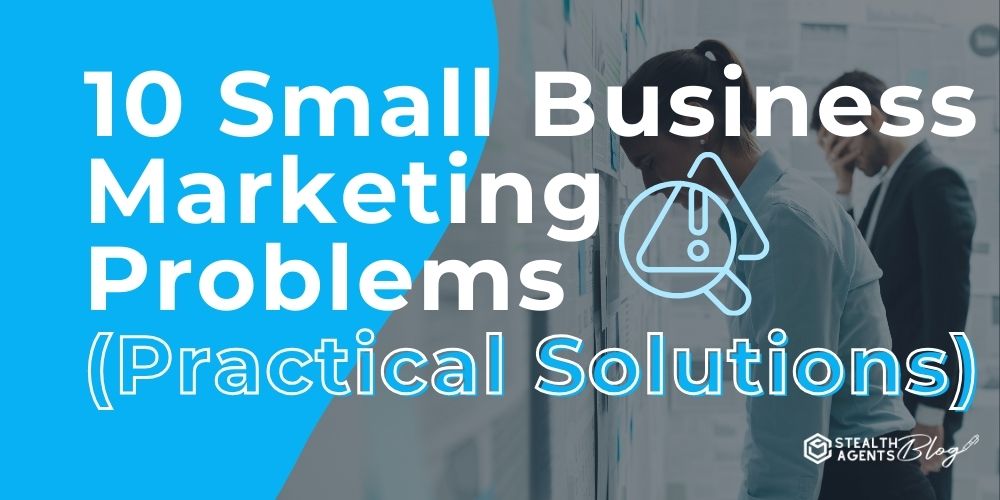Small business marketing problems, including small business marketing challenges and small business marketing pain points, often present obstacles that may seem impossible.
Shockingly, 50% of small businesses fail within the first five years due to inadequate marketing strategies and an inability to implement effective small business marketing solutions. Navigating this competitive landscape demands practical small business problems and solutions that drive actual results.
With tight marketing budgets, every dollar counts, making it crucial to invest in strategies like outsourced marketing automation and outsourced affiliate marketing services that yield the highest ROI. Interestingly, businesses that effectively leverage a marketing virtual assistant with digital marketing services see 2.8 times better revenue growth expectancy, illustrating the power of a strategic approach.
At Stealth Agents, our free consultations offer insights into virtual assistant services and virtual assistant pricing, ensuring your business is equipped to thrive amidst small business problems.
Small Business Marketing Problems
Business without investment marketing problems includes a limited budget, difficulty identifying the targeted audience, lack of brand awareness, ineffective use of social media, creating high-quality content, measuring ROI, poor online visibility, and challenges in lead generation.
1. Limited Budget for Marketing
The limited budget is a significant hurdle for small businesses in terms of marketing.
Small businesses often face significant small business marketing problems, struggling to compete with larger companies that have extensive financial resources for advertising and public relations. An online marketing virtual assistant can provide the support needed to level the playing field and enhance their marketing efforts.
*advertisement*
Tired & Overwhelmed With Administrative Tasks?
Hire A Top 1% Virtual Assistant From Stealth Agents!

Sign Up Below & Hire A Top 1% Virtual Assistant
Rated 4.7 Stars Serving Over 2,000+ Customers.
Hire Top 1% Virtual Assistants For $10-$15 Per Hour
Ask About Our 14 Day Trial!
*advertisement*
However, despite the limited budget, small businesses can still have a substantial impact. The rise of digital marketing offers cost-effective solutions.
Social media platforms offer small businesses a cost-effective solution to reach a vast audience and address common small business marketing problems. Businesses can efficiently manage their social media presence by leveraging remote assistants, enhancing engagement, and overcoming marketing challenges without overspending.
Email marketing is another low-cost, high-return option to consider. Moreover, leveraging local SEO can help small businesses attract customers in their geographical area.
2. Identifying the Target Audience

It’s a critical step, yet due to limited resources or lack of market knowledge, businesses may struggle to pinpoint the exact demographics most likely to need or want their product or service.
Effective methods for small businesses to attract and retain repeat customers include providing exceptional service, offering loyalty programs, personalizing communication, gathering feedback, engaging customers through marketing, maintaining consistent branding, creating exclusive offers, and building relationships through events or online forums.
Marketing efforts can be unfruitful, wasting time and resources without this segmentation.
Conducting market research through surveys and customer interviews and analyzing online consumer behavior can offer valuable insights for finding solutions.
Another effective method is creating buyer personas. These are detailed profiles of your ideal customers, including their behavior patterns, motivations, and goals. Small businesses can use these strategies better to align their marketing efforts with the right audience.
3. Lack of Brand Awareness
They often struggle with building brand awareness. In a packed marketplace, they find it challenging to stand out and create a lasting impression in the minds of customers.
According to a recent survey, nearly 77% of consumers purchase based on brand recognition. To tackle this, businesses should build a strong online presence, starting with a professional website and active profiles on relevant social media platforms.
Small businesses can also differentiate by emphasizing unique selling propositions, providing exceptional service, offering innovative products, focusing on niche markets, building a strong brand, leveraging technology, creating memorable experiences, demonstrating social responsibility, offering competitive pricing, and gathering customer feedback for continuous improvement.
Engaging with customers online through social media, feedback responses, or valuable content can increase brand visibility and foster trust.
Small business marketing problems often include limited reach and brand recognition. Small businesses can establish partnerships with local influencers and other companies to tackle these challenges. Additionally, maintaining consistent branding across platforms, including logos and taglines, enhances their recognizable identity.
4. Ineffective Use of Social Media
Social media can be a powerful tool for small businesses, but misuse can lead to missed opportunities.
Most struggle to generate engaging content, post irregularly, or respond promptly to customer queries.
Marketing missteps can cause significant small business marketing problems, reducing visibility, losing customers, and a weaker online presence. These issues hinder growth, diminish brand reputation, and impact competitiveness, ultimately threatening the long-term success and sustainability of small businesses in today’s digital landscape.
A solution is to create a consistent posting schedule and stick to it. This will ensure reliability and show customers that you are active and engaged.
Also, ensure immediate response to customer comments or messages, which can boost customer satisfaction. It would be best if you also considered using social media management tools, which can help streamline posting and engagement, saving you valuable time.
5. Creating High-Quality Content
Creating high-quality content is another common challenge for small businesses. It requires time, effort, and a firm understanding of the target audience and the marketed product or service.
Lack of Time
Small businesses often lack the manpower to dedicate to content creation. A quick solution is to allocate specific time slots for content generation or consider outsourcing to freelancers.
Small business owners can manage their time effectively by prioritizing tasks, creating a clear marketing plan, using productivity tools, automating repetitive virtual assistant tasks, focusing on high-impact activities, setting aside dedicated time for marketing, outsourcing when needed, continuously optimizing efforts, avoiding multitasking, and practicing self-care to prevent burnout.
Limited Budget
Producing high-quality content can be costly. Therefore, it would be best to opt for cost-effective methods, such as using free online design tools or leveraging user-generated content.

Small businesses facing financial constraints can fund their marketing efforts by allocating a dedicated budget, prioritizing low-cost tactics like social media and content marketing, utilizing guerilla marketing, collaborating with other businesses, bartering services, leveraging community resources, exploring crowdfunding, and seeking grants or subsidies.
Generating Unique Ideas
Generating new content ideas consistently is demanding, especially when addressing small business marketing problems. Staying updated with industry trends is crucial to ensuring your content remains relevant, engaging, and effective in tackling these ongoing marketing challenges.
Maintaining Consistency
Consistently publishing content is vital for sustaining audience engagement and building a loyal following. A well-structured content calendar serves as an essential tool, facilitating strategic planning, ensuring timely delivery, and maintaining a steady flow of relevant and engaging material to captivate your audience.
6. Measuring Marketing ROI
They also face the challenge of accurately measuring their marketing campaigns’ return on investment (ROI).
Many businesses struggle to analyze data and track results from advertising campaigns due to a lack of adequate tools, expertise, or time. For instance, investing $1,000 in a campaign often leaves companies unsure about the exact revenue generated, complicating decision-making.
A simple solution to this issue is to use digital marketing tools designed to track and measure ROI.
These advanced marketing tools provide invaluable insights by tracking the number of people who viewed your campaign, analyzing click-through rates, and measuring purchase conversions. This data empowers businesses to refine their strategies, improve engagement, and ultimately boost sales and return on investment.
Analyzing this data lets you understand which campaigns are effective and worth the investment.
7. Inadequate Digital Marketing Skills
Despite the digital age and billions of active internet users, small businesses still struggle with effective online marketing.
Businesses lacking marketing expertise risk overlooking valuable opportunities to enhance their visibility and engage customers. This oversight can lead to stagnant growth, reduced competitive edge, and the inability to fully capitalize on potential market trends and consumer demands.
The best approach to overcoming this problem is twofold. Firstly, small businesses can invest in digital marketing training for their teams.
Online courses, webinars, and workshops provide businesses with a wealth of knowledge, offering practical insights and up-to-date trends. These resources deliver actionable techniques that can be immediately applied, enhancing marketing strategies and overall effectiveness and increasing brand visibility and competitive advantage.
Secondly, consider outsourcing digital marketing to experts to ensure successful navigation of online channels and reach a broader audience.
8. Keeping Up with Marketing Trends
In the fast-paced world of small business, keeping up with the latest marketing trends can feel overwhelming.
In today’s fast-paced market, companies face an ongoing challenge to adapt to the ever-evolving consumer behavior, rapid technological advancements, and aggressive competitive strategies. These factors significantly impact business operations, necessitating continuous innovation and strategic flexibility to remain competitive and thrive.
For example, the sharp rise in social media usage has driven businesses to shift their focus from traditional advertising to digital platforms.
Continuous learning and adaptation are vital for small businesses to thrive in a competitive landscape. By dedicating time to regular market research, businesses can stay informed about industry trends, customer preferences, and emerging opportunities, enabling them to respond effectively to market changes.
This could involve attending webinars, reading industry reports, or following influential marketing blogs.
9. SEO Challenges
Small businesses often struggle with SEO due to the intricate nature of constantly evolving algorithms, making it difficult to stay updated. Selecting the right keywords requires careful research and strategy while maintaining engaging, optimized content demands ongoing effort and resources for sustainable visibility and growth.
For example, Google handles over 3.5 billion searches daily, making it a challenge to stand out in this vast ocean of information.
Search engines like Google and Bing frequently update their algorithms to ensure users receive the most relevant search results. Small businesses must adapt to these changes or risk a significant decline in search rankings, which can result in diminished online visibility and potential customer losses.
To overcome these challenges, small businesses could consider hiring SEO specialists or using SEO tools to help streamline their efforts.
SEMRush and Moz are user-friendly platforms that offer keyword analytics and tracking, making it easier to adapt to SEO changes.
10. Lead Generation and Conversion
Identifying and converting potential customers into paying clients is a daunting task. Small businesses often struggle to find the right target audience.
Creating compelling content that sparks interest and prompts action can be complex, even with a well-defined audience.
One primary issue is a lack of resources, and another roadblock is the sheer competition in the digital space. Every problem has a solution. To overcome budget constraints, prioritize cost-effective strategies like social media marketing and email campaigns.
These platforms offer tools for targeting specific demographics, making it easier to reach prospective customers.
To truly stand out, it’s crucial to create unique, customer-centric content that prioritizes solving audience problems over mere product promotion. This approach enhances engagement, builds trust, and fosters lasting relationships with your audience, driving long-term success.
Takeaways
Navigating the landscape of small business marketing challenges can often feel like charting unknown territory. Yet, with the right small business marketing solutions, these small business marketing pain points can transform into opportunities for growth and innovation.
Addressing these common small business problems and solutions requires a mix of creativity, persistence, and the right resources to propel your business forward. Implementing practical solutions resolves immediate small business problems and lays a solid foundation for sustained success.
Whether it’s optimizing digital presence or refining customer engagement tactics, small businesses have the potential to thrive in today’s competitive landscape. Understanding and tackling these small business marketing problems head-on sets your business up for long-term prosperity.
Embrace these solutions as stepping stones toward achieving your business objectives and outshining your competitors.
To streamline these efforts and ensure you remain focused on what truly matters, consider leveraging the expertise of a virtual assistant from Stealth Agents to help navigate your marketing challenges effectively.










